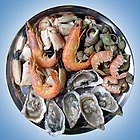Portal:Oceans
The Oceans Portal
A portal dedicated to oceans, seas, oceanography and related topics
– Hover over image and scroll to middle for controls to see more selected panorama images –
Introduction
| Earth's ocean |
|---|
|
Main five oceans division: Further subdivision: Marginal seas |

The ocean is the body of salt water that covers approximately 70.8% of Earth. In English, the term ocean also refers to any of the large bodies of water into which the world ocean is conventionally divided. The following names describe five different areas of the ocean: Pacific, Atlantic, Indian, Antarctic/Southern, and Arctic. The ocean contains 97% of Earth's water and is the primary component of Earth's hydrosphere; thus the ocean is essential to life on Earth. The ocean influences climate and weather patterns, the carbon cycle, and the water cycle by acting as a huge heat reservoir. (Full article...)

A sea is a large body of salty water. There are particular seas and the sea. The sea commonly refers to the World Ocean, the wider body of seawater. Particular seas are either marginal seas, second-order sections of the oceanic sea (e.g. the Mediterranean Sea), or certain large, nearly landlocked bodies of water. (Full article...)
Oceanography (from Ancient Greek ὠκεανός (ōkeanós) 'ocean' and γραφή (graphḗ) 'writing'), also known as oceanology, sea science, ocean science, and marine science, is the scientific study of the ocean. It is an Earth science, which covers a wide range of topics, including ecosystem dynamics; ocean currents, waves, and geophysical fluid dynamics; plate tectonics and seabed geology; and fluxes of various chemical substances and physical properties within the ocean and across its boundaries. These diverse topics reflect multiple disciplines that oceanographers utilize to glean further knowledge of the world ocean, including astronomy, biology, chemistry, geography, geology, hydrology, meteorology and physics. Paleoceanography studies the history of the oceans in the geologic past. An oceanographer is a person who studies many matters concerned with oceans, including marine geology, physics, chemistry, and biology. (Full article...)
Selected article -

The Challenger Deep is the deepest known point of the seabed of Earth, located in the western Pacific Ocean at the southern end of the Mariana Trench, in the ocean territory of the Federated States of Micronesia. According to the GEBCO Gazetteer of Undersea Feature Names the depression's depth is 10,920 ± 10 m (35,827 ± 33 ft) at , although its exact geodetic location remains inconclusive and its depth has been measured at 10,902–10,929 m (35,768–35,856 ft) by deep-diving submersibles, remotely operated underwater vehicles, benthic landers, and sonar bathymetry. The differences in depth estimates and their geodetic positions are scientifically explainable by the difficulty of researching such deep locations.
The depression is named after the British Royal Navy survey ships HMS Challenger, whose expedition of 1872–1876 first located it, and HMS Challenger II, whose expedition of 1950-1952 established its record-setting depth. The first descent by any vehicle was by the bathyscaphe Trieste in January 1960. In March 2012, a solo descent was made by film director James Cameron in the deep-submergence vehicle Deepsea Challenger. As of July 2022, 27 people have descended to Challenger Deep. (Full article...)Interesting facts -
- In 1989, the colonial coral Astroides calycularis expanded its range to the Adriatic Sea after previously being restricted to an area west of Sicily.
- San Diego physician Fred Baker was a co-founder of the Scripps Institution of Oceanography and the San Diego Zoo.
- The sea hedgehog is a cannibal.
Selected list articles and Marine habitat topics
| Marine habitats |
|---|
| Coastal habitats |
| Ocean surface |
| Open ocean |
| Sea floor |
- List of oceans
- List of ancient oceans
- List of seas
- List of circumnavigations
- List of cruise lines
- List of largest lakes and seas in the Solar System
- List of marine biologists
- List of marine ecoregions
- List of maritime explorers
- List of naval battles
- List of ocean liners
- List of oceanographic institutions and programs
- List of oldest surviving ships
- List of rogue waves
- List of seafood dishes
- List of submarine topographical features
Tasks
 |
Here are some tasks awaiting attention:
|
General images -
Related portals
In the news
- 10 August 2024 – Russian invasion of Ukraine
- The Ukrainian Navy strikes and heavily damages a Russian offshore natural gas platform in the Black Sea being used by the Russian Armed Forces. (Reuters)
- 5 August 2024 – Red Sea crisis
- The Houthis claim an attack on the Liberia-flagged container ship MV Groton in the Gulf of Aden. (Al Jazeera)
- 26 July 2024 – Finland–Russia relations
- Finland reports that a Russian Navy Baltic Sea fleet vessel trespassed on Finnish territorial waters in the eastern Gulf of Finland. (Reuters)
- 24 July 2024 –
- Polish divers announce that they have discovered a 19th-century shipwreck in the Baltic Sea off the coast of Sweden, containing crates of champagne and porcelain. (France 24)
- 21 July 2024 – Red Sea crisis
- 2024 Israeli strikes on Yemen
WikiProjects
Topics
Categories
Associated Wikimedia
The following Wikimedia Foundation sister projects provide more on this subject:
-
Commons
Free media repository -
Wikibooks
Free textbooks and manuals -
Wikidata
Free knowledge base -
Wikinews
Free-content news -
Wikiquote
Collection of quotations -
Wikisource
Free-content library -
Wikiversity
Free learning tools -
Wiktionary
Dictionary and thesaurus
Admiralty law
| Admiralty law |
|---|
| History |
| Features |
| Contract of carriage/Charterparty |
| Parties |
| Judiciaries |
| International conventions |
| International organizations |
Need assistance?

Do you have a question about oceans, seas or oceanography that you can't find the answer to? Consider asking it at the Wikipedia reference desk.
External media

- World Ocean Database and World Ocean Atlas Series – from the U.S. National Centers for Environmental Information, National Oceanic and Atmospheric Administration. Includes the World Ocean Atlas.
- European Atlas of the Seas – the European Atlas of the Seas, from the European Commission
- NOAA Research – NOAA research news, Oceanic and Atmospheric Research (OAR)
- Ocean Research – from The World Ocean Observatory
- Ocean Biodiversity Information System – "a global open-access data and information clearing-house on marine biodiversity for science, conservation and sustainable development"









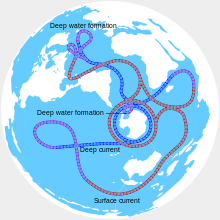





















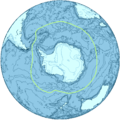























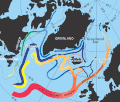





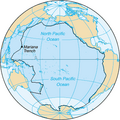
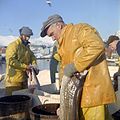

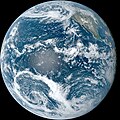






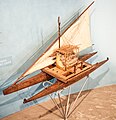








![Image 73An exclusive economic zone (EEZ) map of the Pacific which excludes non-tropical islands.[why?] (from Pacific Ocean)](http://upload.wikimedia.org/wikipedia/commons/thumb/b/bc/Map_of_the_Exclusive_Economic_Zones_of_the_Pacific_Ocean.png/120px-Map_of_the_Exclusive_Economic_Zones_of_the_Pacific_Ocean.png)
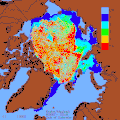















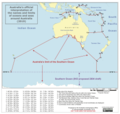















![Image 108"Terres Australes" [sic] label without any charted landmass (from Southern Ocean)](http://upload.wikimedia.org/wikipedia/commons/thumb/8/8e/Geography_world_map.jpeg/120px-Geography_world_map.jpeg)









